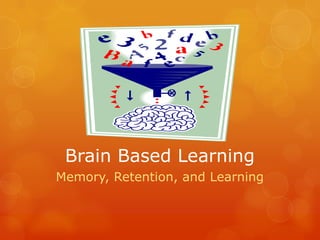Memory, Retention and Learning
•Télécharger en tant que PPTX, PDF•
3 j'aime•17,367 vues
This document discusses brain-based learning and memory. It explains that memory allows humans to remember past experiences and use them to respond to future events. There are two types of long-term memory: declarative and nondeclarative. Declarative memory involves consciously remembering facts and events, while nondeclarative memory involves procedural skills and emotions. The document also discusses how understanding memory can help teachers select strategies to improve student retention and retrieval of learned information. Effective strategies include distributed practice over time rather than cramming, and using hands-on learning and immediate application of knowledge.
Signaler
Partager
Signaler
Partager

Recommandé
Contenu connexe
Tendances
Tendances (20)
Forgetting- Definition , Types of Forgetting, Theories of Forgetting, Ebbingh...

Forgetting- Definition , Types of Forgetting, Theories of Forgetting, Ebbingh...
Similaire à Memory, Retention and Learning
Similaire à Memory, Retention and Learning (20)
What every Teacher should know about Learning, Memory and the Brain. ppt

What every Teacher should know about Learning, Memory and the Brain. ppt
Plus de Linda Nitsche
Plus de Linda Nitsche (20)
Differentiated Professional Development ~ Literacy

Differentiated Professional Development ~ Literacy
Dernier
Mehran University Newsletter is a Quarterly Publication from Public Relations OfficeMehran University Newsletter Vol-X, Issue-I, 2024

Mehran University Newsletter Vol-X, Issue-I, 2024Mehran University of Engineering & Technology, Jamshoro
Dernier (20)
Fostering Friendships - Enhancing Social Bonds in the Classroom

Fostering Friendships - Enhancing Social Bonds in the Classroom
Plant propagation: Sexual and Asexual propapagation.pptx

Plant propagation: Sexual and Asexual propapagation.pptx
HMCS Max Bernays Pre-Deployment Brief (May 2024).pptx

HMCS Max Bernays Pre-Deployment Brief (May 2024).pptx
This PowerPoint helps students to consider the concept of infinity.

This PowerPoint helps students to consider the concept of infinity.
HMCS Vancouver Pre-Deployment Brief - May 2024 (Web Version).pptx

HMCS Vancouver Pre-Deployment Brief - May 2024 (Web Version).pptx
Basic Civil Engineering first year Notes- Chapter 4 Building.pptx

Basic Civil Engineering first year Notes- Chapter 4 Building.pptx
Kodo Millet PPT made by Ghanshyam bairwa college of Agriculture kumher bhara...

Kodo Millet PPT made by Ghanshyam bairwa college of Agriculture kumher bhara...
Interdisciplinary_Insights_Data_Collection_Methods.pptx

Interdisciplinary_Insights_Data_Collection_Methods.pptx
On National Teacher Day, meet the 2024-25 Kenan Fellows

On National Teacher Day, meet the 2024-25 Kenan Fellows
Memory, Retention and Learning
- 1. Brain Based Learning Memory, Retention, and Learning
- 2. Take a moment to think about what you know about the brain’s ability to remember and retain new information. How does this affect your classroom instruction? What strategies do you use to make sure students retain information?
- 3. What is memory? Gives us a past Gives us a record of who we are Essential for human individuality Without it, life would be a series of meaningless encounters that have no link to the past and no use for the future. Allow individuals to remember experiences and use them to respond to future events.
- 4. Two Types of Long Term Memory Nondeclarative Declarative • Sometimes called implicit • Also called conscious or memory. explicit memory • Previous experiences aid • Remembering in the performance of a names, facts, music, and task without conscious objects. awareness of these previous experiences • Conscious, intentional recollection of previous experiences and information
- 5. 3 Types of Nondeclarative Memory 1. Procedural- remembering how to do something (Think of something you did this morning that required procedural memory.) 2. Motor Skill Memory- performance of daily skills we do without even realizing we learned them or are using memory to do it. (Think of something you did this morning that required motor skill memory) 3. Emotional Memory- unconscious response can turn them toward or away from similar learning experiences Flashbulb memory is called by such as powerful emotional experience that we can instantly store it in our long term memory.
- 6. 2 Types of Declarative Memory Episodic Memory Semantic Memory • Memory of events • Knowledge of facts in one’s own and dates not history related to any • Helps a person event. identify time and place an event happened
- 7. Why is this important for educators? How a learner processes new information presented in school has a great impact on the quality of what is learned and is a major factor in retaining information. Understanding memory and how it is formed can help teachers select strategies to improve retention and retrieval of information.
- 8. Learning and Retention Learning Retention Involves brain, nervous system, and Process by which long environment. term memory preserves a learning so that it can Can learn something for locate, identify and a few minutes and then retrieve it in the future. lose it
- 10. Did You Know? The idea of “Practice makes Perfect” is rarely true. If a learner practices a skill incorrectly, unlearning and relearning the skills is very difficult. Cramming for an exam is called massed practice. This is not an effective strategy for retention. Distributed practice over time is the key to retention. By forgetting something trivial, we allow room for more important and meaningful experiences. We remember best what comes first, second best what comes last, and least of what is in the middle. It is important to teach new information first! Kids are so used to quick change and novelty in their environment so it is important to keep learning segments shorter. Teachers that go off task between learning segments keep the kids more focused during learning segments. Kids will retain 5% of information taught in lecture but 90% if they teach others or use the information immediately. Kids will retain 75% of the information if they practice by doing.
